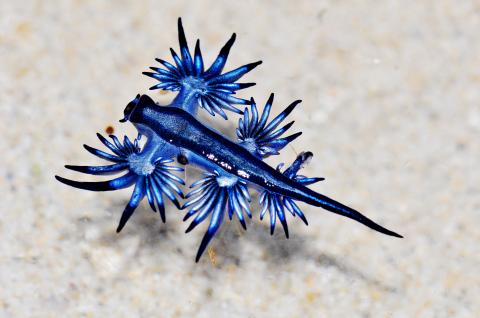The discovery of a distinctive sea slug off Siaoliouciou Island (小琉球) in Pingtung County is shedding light on climate change, a scientist said.
Although Glaucus atlanticus, the only member of the genus Glaucus, is usually found in tropical areas, it had never previously been spotted in Taiwanese waters.
Wang Tien-cheng (王添正), a bed-and-breakfast owner and tour guide, noticed a group of about 60 Glaucus atlanticus near the Duozaiping intertidal zone (肚仔坪潮間帶), while taking some customers on a tour.

Photo: Courtesy of Lo Liu-chih
The 37-year-old Wang also has 11 years of experience guiding underwater snorkeling tours and he often posts pictures of the scenic beauty of the island on his Facebook page.
After giving some of the slugs to Lo Liu-chih (羅柳墀), an assistant professor at National Kaohsiung Normal University’s department of geography, Lo’s research team confirmed that it was the first time Glaucus atlanticus had been seen in the Siaoliouciou area.
Announcing the discovery on Sunday, Lo said that Glaucus atlanticus was first discovered in 1777 by European academics.
Pointing to the slug’s three pairs of symmetrical, protruding hand-like limbs, as well as its vibrant blue tail, Lo said these feature has contributed to the origin of the slug’s name.
The Europeans who discovered the sea slug felt it resembled Glaucus, a fisherman in Greek mythology who after ingesting a magical herb which could bring fish back to life, became immortal and grew fins in place of his arms and legs, according to Roman poet Ovid.
Lo said warming seawater caused by climate change could explain the northward migration of Glaucus atlanticus, but he added that an abundance of Portuguese man-o’-war — the sea slugs favored prey along with velella, a type of jellyfish — in the waters around Siaoliouciou could also account for the presence of the sea slug.
Glaucus atlanticus are immune to the man-o’-war venom and they even have an organ which allows them to store the venom, giving the sea slugs the ability to deal a far stronger sting than the man-o’-war,
Lo warned that any observation of the slug should be done with extreme caution.
Lo also said people should avoid coming into physical contact with the slug and added that Glaucus atlanticus is not edible.
Translated by Jake Chung, staff writer

An essay competition jointly organized by a local writing society and a publisher affiliated with the Chinese Communist Party (CCP) might have contravened the Act Governing Relations Between the People of the Taiwan Area and the Mainland Area (臺灣地區與大陸地區人民關係條例), the Mainland Affairs Council (MAC) said on Thursday. “In this case, the partner organization is clearly an agency under the CCP’s Fujian Provincial Committee,” MAC Deputy Minister and spokesperson Liang Wen-chieh (梁文傑) said at a news briefing in Taipei. “It also involves bringing Taiwanese students to China with all-expenses-paid arrangements to attend award ceremonies and camps,” Liang said. Those two “characteristics” are typically sufficient

A magnitude 5.9 earthquake that struck about 33km off the coast of Hualien City was the "main shock" in a series of quakes in the area, with aftershocks expected over the next three days, the Central Weather Administration (CWA) said yesterday. Prior to the magnitude 5.9 quake shaking most of Taiwan at 6:53pm yesterday, six other earthquakes stronger than a magnitude of 4, starting with a magnitude 5.5 quake at 6:09pm, occurred in the area. CWA Seismological Center Director Wu Chien-fu (吳健富) confirmed that the quakes were all part of the same series and that the magnitude 5.5 temblor was

The brilliant blue waters, thick foliage and bucolic atmosphere on this seemingly idyllic archipelago deep in the Pacific Ocean belie the key role it now plays in a titanic geopolitical struggle. Palau is again on the front line as China, and the US and its allies prepare their forces in an intensifying contest for control over the Asia-Pacific region. The democratic nation of just 17,000 people hosts US-controlled airstrips and soon-to-be-completed radar installations that the US military describes as “critical” to monitoring vast swathes of water and airspace. It is also a key piece of the second island chain, a string of

The Central Weather Administration has issued a heat alert for southeastern Taiwan, warning of temperatures as high as 36°C today, while alerting some coastal areas of strong winds later in the day. Kaohsiung’s Neimen District (內門) and Pingtung County’s Neipu Township (內埔) are under an orange heat alert, which warns of temperatures as high as 36°C for three consecutive days, the CWA said, citing southwest winds. The heat would also extend to Tainan’s Nansi (楠西) and Yujing (玉井) districts, as well as Pingtung’s Gaoshu (高樹), Yanpu (鹽埔) and Majia (瑪家) townships, it said, forecasting highs of up to 36°C in those areas